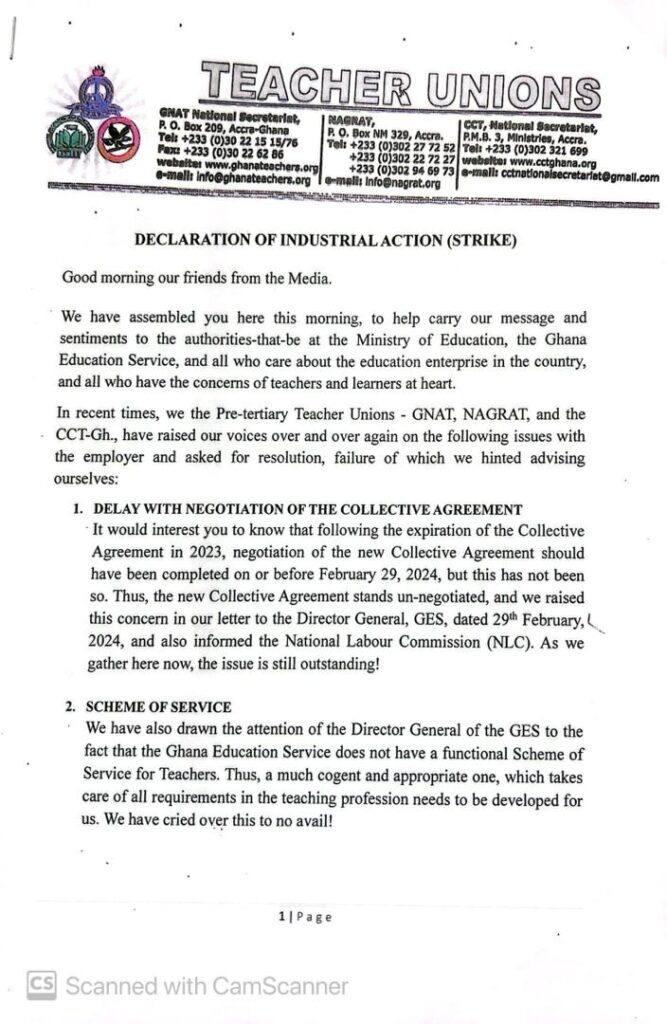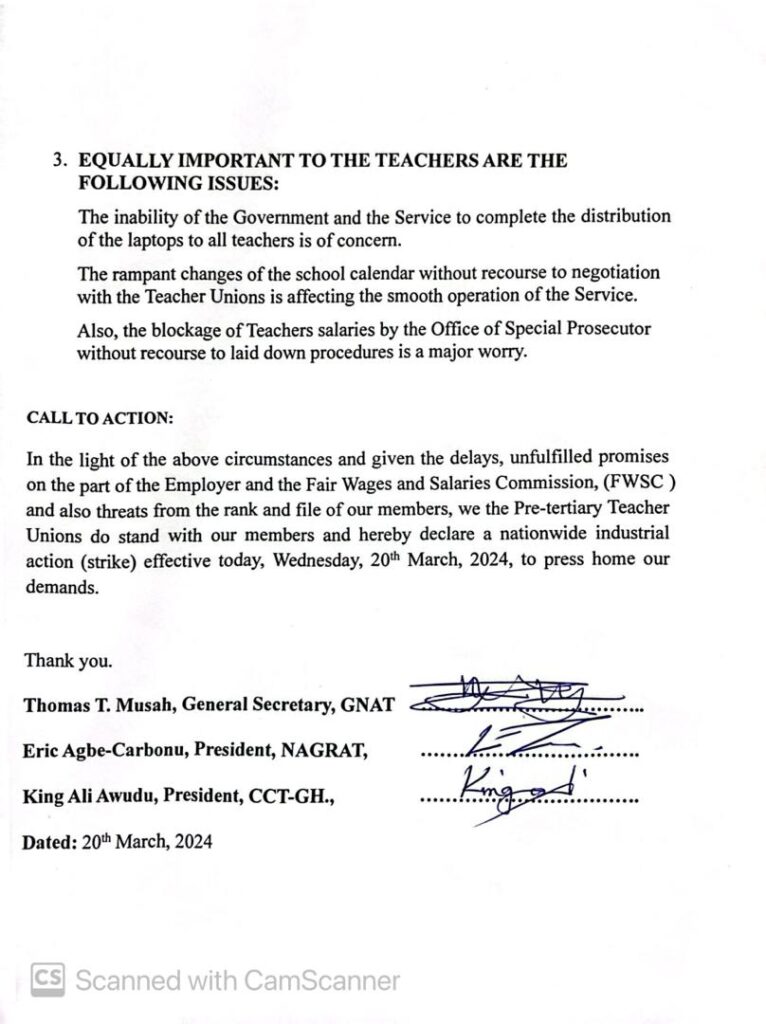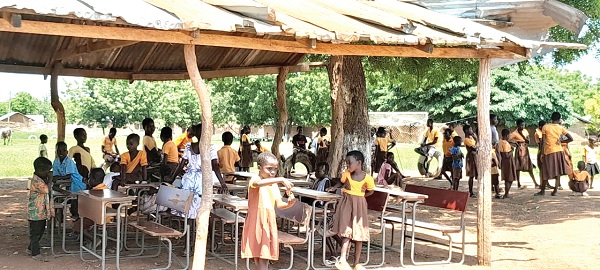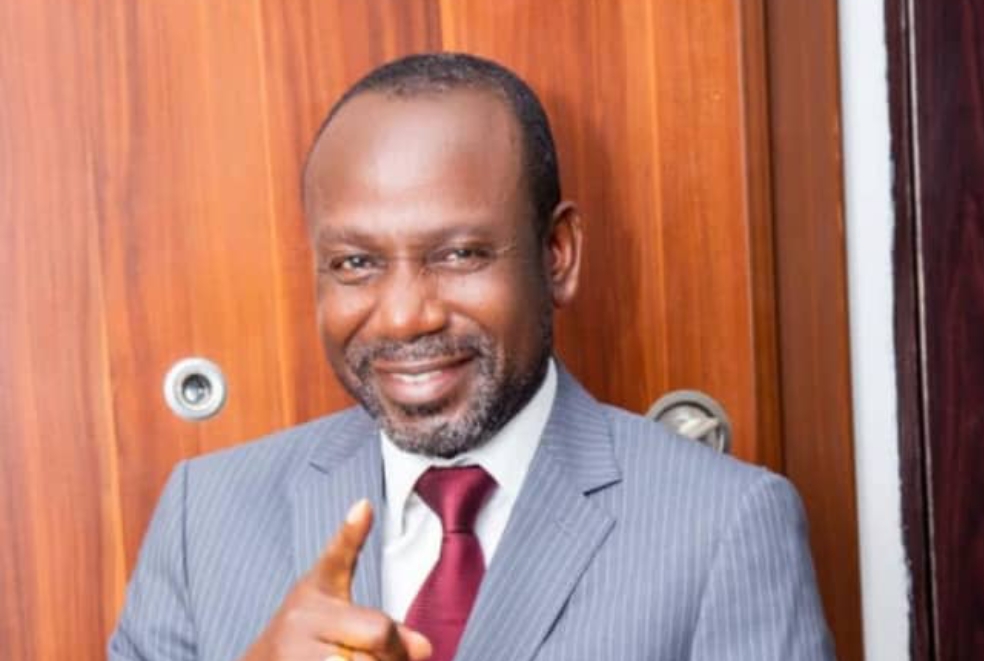

The three teacher unions (GNAT, NAGRAT, and CCT-GH) have declared a nationwide strike again due to the negligence of the government. This has become an annual ritual in the country.
We must know that teacher unions play a pivotal role in advocating for the rights and welfare of teachers, ensuring quality education, and character training, and fostering a conducive teaching environment. In Ghana, recent strike actions by the three teacher unions (GNAT, NAGRAT, and CCT-GH) have highlighted longstanding grievances and concerns that demand serious attention and resolution. As these unions gear up for further action, they must adopt a stance of seriousness and firmness to effectively address their demands and yield tangible results from the government.
Check the below statements from the unions:


Ghana’s education system faces numerous challenges, including inadequate resources, infrastructural deficits, low salaries, total poor conditions of service, and insufficient support for teachers. These issues have persisted despite government promises and initiatives, prompting teacher unions to resort to strike actions as a means of drawing attention to their plight and demanding action.
In past instances, strike actions by teacher unions in Ghana have often led to temporary solutions or unfulfilled promises from authorities. The national labor is always seen when there’s strike action. To break this cycle and achieve meaningful change, teacher unions must approach negotiations with a renewed sense of seriousness. This entails:
- Clear Objectives: Define specific, achievable goals that address the core concerns of teachers, such as salary increments, improved working conditions, and better educational resources. These objectives should be communicated transparently to members and stakeholders.
- Unified Front: Ensure solidarity and cohesion among union members to strengthen bargaining power. Divisions within the union weaken its ability to negotiate effectively and may dilute the impact of strike actions.
- Strategic Timing: Choose the timing of strike actions wisely, considering factors such as the academic calendar, public sentiment, and political climate. A well-timed strike can maximize pressure on authorities while minimizing disruption to students’ learning.
- Effective Communication: Maintain open channels of communication with both members and the public to articulate the rationale behind the strike action, dispel misconceptions, and garner support. Transparency fosters trust and enhances the credibility of the union’s demands.
- Sustained Pressure: Stay committed to the cause and be prepared for protracted negotiations if necessary. Resilience in the face of challenges demonstrates the determination of the union to achieve its objectives and encourages authorities to engage seriously in finding solutions.
While seriousness is essential, firmness is equally crucial in ensuring that the demands of teacher unions are not overlooked or dismissed lightly. Firmness involves:
- Negotiation Skills: Equip union representatives with strong negotiation skills and expertise to engage in constructive dialogue with government officials and education stakeholders. A firm yet diplomatic approach can facilitate productive negotiations and lead to mutually beneficial outcomes.
- Accountability Measures: Hold the government accountable for its commitments and ensure that agreements reached during negotiations are implemented in a timely and transparent manner. Establish mechanisms for monitoring progress and addressing any deviations from agreed-upon terms.
- Legal Support: Seek legal guidance and support to safeguard the rights of union members and navigate the legal framework governing labor relations. A sound understanding of relevant laws and regulations strengthens the union’s position and reinforces its ability to advocate effectively.
- Public Engagement: Harness public support through advocacy campaigns, media outreach, and community involvement. Garnering public sympathy and solidarity can exert additional pressure on authorities to address the concerns raised by teacher unions and prioritize education reform.
Above all, the challenges facing teachers in Ghana demand a resolute and unwavering response from their unions. By embodying a spirit of seriousness and firmness, teacher unions can elevate their advocacy efforts, amplify their voices, and effect meaningful change within the education sector. With concerted action and strategic engagement, Ghanaian teachers can secure the improvements they deserve and contribute to the advancement of quality education for all.
I am a concerned citizen of Ghana. Africa is born in me. Ghana first.
Signed
William Boadi
Executive Director of EAI, Educationist, Political analyst, and Social Worker.
+233541935106.
EAI: Promoting Quality Education, and Social Justice.




